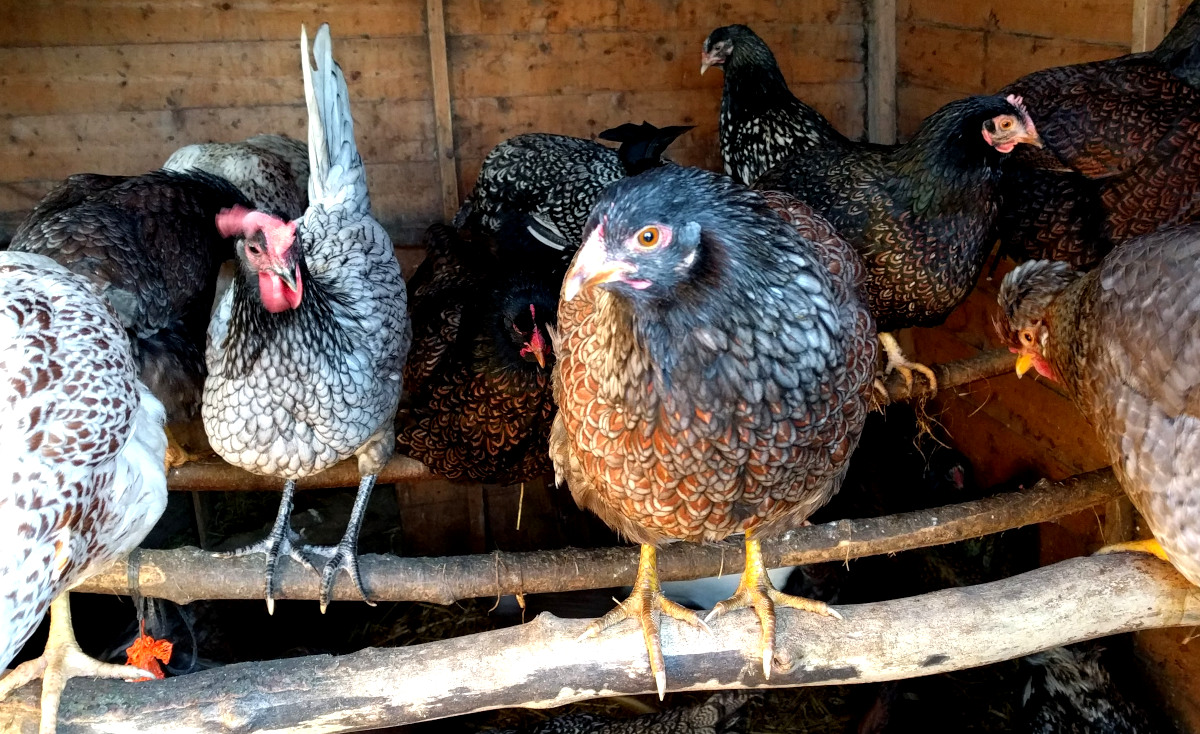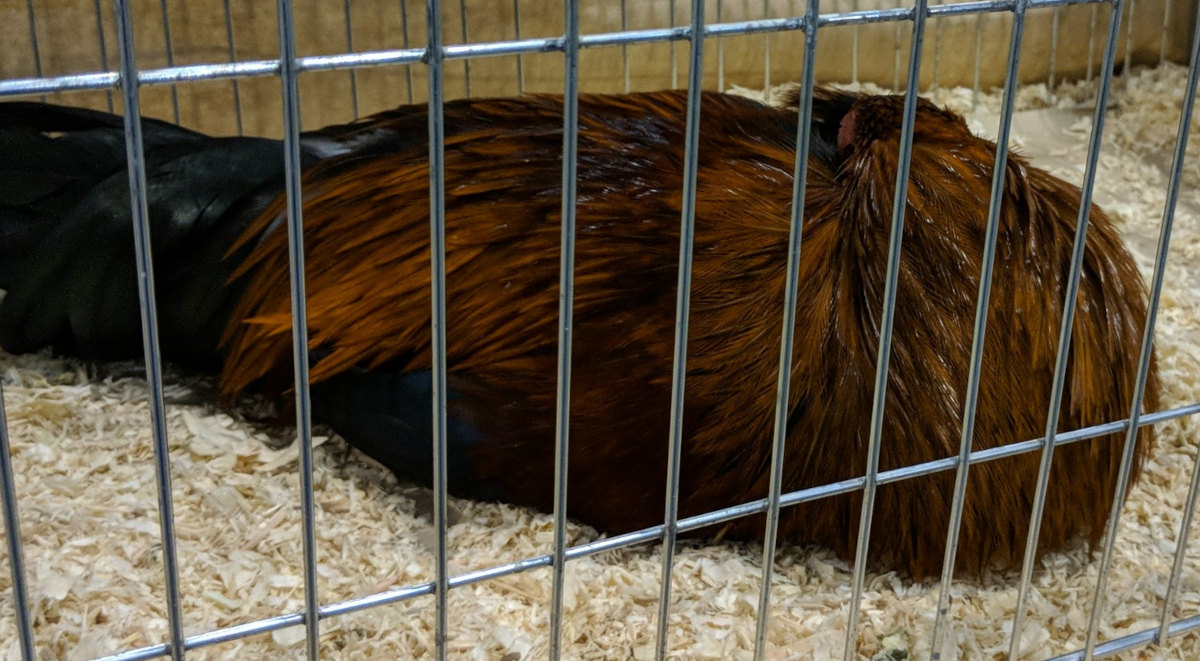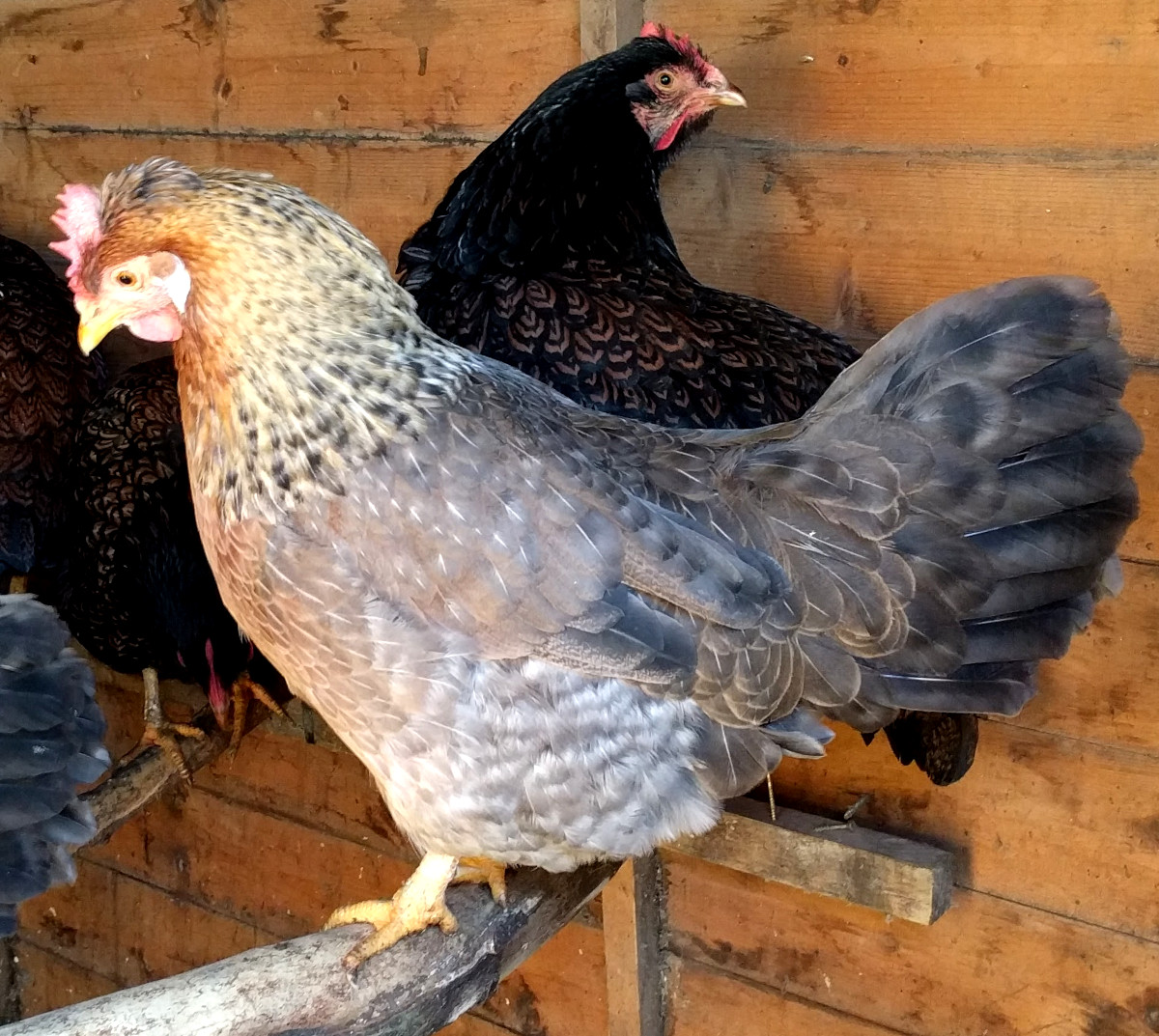Why your chickens are awake at night and what to do about it.

Chickens are a diurnal species which are active during the daylight hours and do not have good night vision. They have excellent eyesight during the day, but their vision is poor in low light conditions. This is because they have fewer rods than humans, which are the cells in the eye that are responsible for night vision.
Table of Contents
Chickens can still see some things in the dark, but they are not as good at seeing movement or detail. This is why it is important to provide them with a safe and secure environment at night.
Continuous sleep deprivation can have detrimental effects on chickens' health and well-being. Chickens need adequate rest to maintain their physiological and behavioural functions.
Disrupted sleep patterns, whether due to natural instincts or artificial lighting, can result in stress, decreased immune function, and reduced overall welfare.
It is common for there to be flapping around as the birds settle for the night. A game of musical perches with associated flapping and clucking as the flocks finds is position on the perch is a nightly occurrence in my coops.
Chickens do move around a little at night, they often shift their weight from one leg to another or stretch their wings and legs and even turn around on the perch. All this shuffling around is quite normal.
One thing I have noticed here with my chickens is that in the depths of winter the birds are well awake when I go to let them out in the morning.
Because the nights at this time of year are so long they have had their sleep and are now hungry and ready to get up but are forced to stay on the perch for another few hours. You may hear a lot of flapping, clucking and shuffling around at this time of year.
Things that wake chickens up in the night:
Chickens, like many other animals, have an internal biological clock known as the circadian rhythm. This clock regulates various physiological processes in their bodies, including sleep-wake cycles.
Chickens have evolved to have a flexible circadian rhythm, which allows them to adapt to changes in light and dark cycles. This means that their sleep patterns are not solely determined by the rising and setting of the sun, but also influenced by other factors such as temperature, noise, and social interactions.
The reasons why chickens might be awake and clucking at night:
- Mites or parasites: In my experience one of the biggest disturbers of sleep in chickens is the red mite. These hide during the day and come out to feed on the chickens blood during the night.
- Predators: Chickens are prey animals, and they are naturally alert to danger. If they hear or see something that they perceive as a threat, they may cluck to warn the other chickens.
- Light: Chickens are diurnal animals, which means that they are active during the day and sleep at night. However, they can be affected by artificial light, and they may be more likely to be awake and active at night if they are exposed to light.
- Your letting your chickens sleep on the floor or in the nests: Roosting is essential for the long term health of a chicken and sleeping in groups on the floor or in the the nesting boxes will pretty much guarantee a disturbed nights sleep.
- Vermin: Rats can disturb chickens a night and have even been known to bite toes and feet.
- Stress: Chickens are social animals, and they need plenty of stimulation to stay happy and healthy. If they are bored, they may start clucking at night to try to get attention.
- Loud noises: Just like you and me, banging or loud noise can disturb chickens.
- Health problems: If a chicken is sick or injured, it may be more likely to be awake and could be on the floor.
- Heat or cold: Excessively hot weather or cold draughts can disrupt a chickens nighttime behaviour.
If you notice that your chickens are awake and clucking at night, it is important to try to determine the cause.
If you think that they are being bothered by predators, you can take steps to make your coop more secure. Trap and control vermin and treat the chickens and the coop for a infestation of parasites. Chickens have a particular warning cluck when there are predators about.
If you think that they are being affected by artificial light, you can try to reduce the amount of light that they are exposed to at night. If you can read the words on a page in a book or newspaper then that is too much light for your chickens. Try covering the window in their coop with a shutter at night to lower the light and sound levels.
Chickens rely on natural light cues to regulate their sleep-wake cycles, and when exposed to artificial light for extended periods, they may have difficulty distinguishing between day and night.
If you think that they are stressed, you can try to provide them with more space, toys and activities to keep them occupied.
And if you think that they have a health problem, you should take them to the vet for a checkup.
Why do cockerels crow at night:
Roosters can, and do, crow whenever they feel like it, even at night. Over the years I have had some that did it occasionally and one or two that did it all the time. The short answer is that you might not be able to stop a cockerel crowing at night.
Poultry keepers expect their roosters to begin crowing as dawn approaches, but the sky gets light long before the sun actually rises and even the faintest glow on the horizon can signal the dawn for an over exited cockerel.
Artificial light cam also be a problem here. If you have security or street lights that overlook the coop during the hours of darkness it can start the crowing.
Roosters are territorial animals, and they will crow to mark their territory and warn off other roosters. They may also crow to attract hens. This is hard wired into their brain and can not be switched off or trained out of them.
Roosters can communicate with each other over long distances by crowing. This is how they keep track of each other and coordinate their activities.
Below: This cockerel is fast asleep.

Roosters may also crow when they are excited or frustrated. For example, they may crow when they are about to mate or when they are being chased or been fighting with another cockerel.
If you have a cockerel that is crowing in the dark, it is important to try to determine the reason. If he is crowing to establish his territory or to communicate with other roosters, there is not much you can do to stop him and he will happily keep on making a ruckus, even in the dead of night.
However, if he is crowing because he is scared or frustrated, you may be able to help him by making his environment more secure or by providing him with more enrichment.
About a chickens sleep:
Chickens sleep for on average 12 hours a day, usually from dusk to dawn. As twilight approaches they will move closer to the coop and begin to roost on the perches.
Below: They prefer to sleep high up, standing up on a perch. This is because chickens are prey animals and sleeping on the ground makes them more vulnerable to predators.

Like humans, chickens experience Rapid Eye Movement (REM) sleep, where, like us they dream, although their REM only lasts a few seconds to minutes.
Chickens have a unique type of sleep called unihemispheric slow-wave sleep (USWS). This means that they can sleep with one eye open and the other closed. This allows them to be both asleep and alert at the same time. USWS is thought to help chickens stay safe from predators.
Studies have shown that when chickens sleep on a roost, the birds on the outside edges will keep their outer eyes open, and shut down their brains on the opposite side and close that eye while those in the middle sleep with both closed. Half way through the night the chickens on the edges of the roost turn 180 degrees, shut down the other half of their brains, and open the other eye. This gives the other half of their brains a chance to sleep.
Chickens have a special ability to recover lost sleep from the previous night by napping in short bursts during the day. They also show no ill effects from mild sleep deprivation, unlike us humans, which for a prey animal is a valuable skill.
How to make sure your hens sleep through the night:
Here are some tips for helping your chickens get a good night's sleep:
- Provide a comfortable roost that is at least 18 inches off the ground.
- Make sure the flock has a full crop before bedtime.
- Make sure the chicken coop is dark and quiet.
- Keep the chicken coop clean and free of pests and vermin.
- Feed your chickens a healthy diet.
- Give your chickens plenty of time to exercise during the day.
You can not make your chickens go to sleep, you just need to provide them with a suitable and safe environment and they will go to bed themselves.
